

Rogue Economist Rants: Some suggestions to improve MMT and the JG proposal. Cullen Roche, along with TC and Beowulf, have a new initiative, to flesh out a quasi-MMT economic paradigm, and will likely start website dedicated to it.
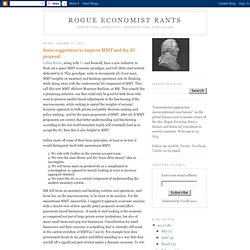
This paradigm seeks to incorporate all, if not most, MMT insights on monetary and banking operations into its thinking while doing away with the controversial JG component of MMT. They call this new MMT offshoot Monetary Realism, or MR. An argument for private sector JG. The electorate votes for a public sector which it thinks is of a size such that the marginal product of labour in both private and public sector is the same.
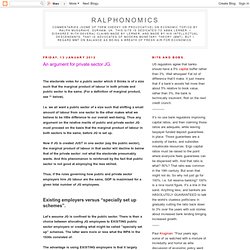
(For a definition of marginal product, see ** below). I.e. we all want a public sector of a size such that shifting a small amount of labour from one sector to the other makes what we believe to be little difference to our overall well-being. Thus any argument on the relative merits of public and private sector JG must proceed on the basis that the marginal product of labour in both sectors is the same, before JG is set up. Government as employer of last resort. This is a summary of the arguments for allocating ELR people to EXISTING employers rather than to specially set up schemes or “employers” as was the case with the WPA in the 1930s.
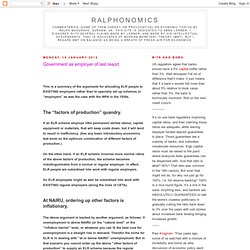
The “factors of production” quandry. If an ELR scheme employs little permanent skilled labour, capital equipment or materials, that will keep costs down, but it will tend to result in inefficiency. (See any basic introductory economics text book on the optimum combination of different factors of production.) On the other hand, if an ELR scheme involves more normal ratios of the above factors of production, the scheme becomes indistinguishable from a normal or regular employer: in effect, ELR people are subsidised into work with regular employers. So ELR employees might as well be subsidised into work with EXISTING regular employers (along the lines of CETA). Malcolm Sawyer and government as employer of last resort. Internet discussion about having government act as employer of last resort (ELR) has flared up in the last week amongst advocates of Modern Monetary Theory.

So I thought I’d set out a brief summary of a paper by an opponent of ELR: Malcolm Sawyer (Prof of economics at Leeds University in the UK). His paper is 14,000 words, so some people might prefer something a bit shorter: the summary below is about a tenth as long. This summary is bound to be inaccurate in some respects. Why do ELR proponents always advocate public sector type work?
About fifty million people throughout history have tumbled the fact that there are an infinite number of public sector type jobs that the unemployed could to: sweeping the streets, maintaining public parks, etc.

These advocates of having government act as employer of last resort (ELR) nearly always advocate PUBLIC SECTOR type work, rather than PRIVATE SECTOR type work. And there is an appealing logic here, namely that the output of the public sector is GIVEN AWAY rather than SOLD. Thus demand does not need to be raised to create said public sector type jobs. (At least that is presumably the logic employed: the logic is rarely spelled out.) That would seem to mean that there cannot be any inflationary effect from said public sector jobs. If unemployment is above NAIRU, or the “natural level” or the “inflation barrier” level, as Bill Mitchell calls it, a straight rise in demand is far preferable to any sort of ELR job. Employer of Last Resort, buffer stocks and price anchors. The folk who advocate having government as employer of last resort (ELR) often claim that ELR employees form a “buffer stock”, which works in the same way as the physical buffer stocks that governments sometimes maintain to iron out fluctuations in the price of physical commodities.

The alternative to ELR is unemployment, and of course both the unemployed and ELR employees act as a buffer stock – in that the buffer stock analogy has any substance, which I don’t think it does. As regards preventing sudden FALLS in the price of labour, does the above so called buffer stock achieve this? The answer is “no”, because it’s very difficult to get the price of labour to fall: as Keynes rightly pointed out, “wages are sticky downwards”. As regards INCREASES in the price of labour, does the alleged buffer stock prevent an excess rise in wages given excess aggregate demand? Nope. In fact wages and prices can rise much faster than is acceptable long before the so called buffer stock runs out. The effect of temporary subsidised employment on employability. Temporary subsidised employment (TSE), like the Job Guarantee, and the training that is often associated with TSE hopefully raises or at least maintains the employability of those concerned.

But is this the actual effect? These two studies done in Switzerland claim that TSE in the private sector produces significant benefits. UK graduate, Cait Reilly, objects to her new JG job. Subsidised temporary employment is not a bad way of dealing with unemployment.
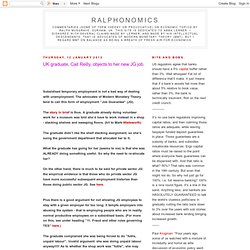
The advocates of Modern Monetary Theory tend to call this form of employment “Job Guarantee” (JG). The story in brief is thus. A graduate already doing volunteer work for a museum was told she’d have to work instead in a shop - stacking shelves and sweeping floors. (h/t to Mark Wadsworth) The graduate didn’t like the shelf stacking assignment, so she’s suing the government department that allocated her to it. –Why Modern Monetary Theory’s Employer of Last Resort is a bad idea. « #Monetary Sovereignty – Mitchell. Mitchell’s laws: Reduced money growth never stimulates economic growth.
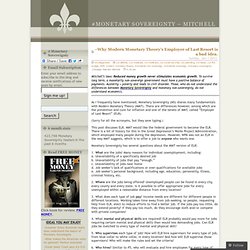
To survive long term, a monetarily non-sovereign government must have a positive balance of payments. Austerity = poverty and leads to civil disorder. –A reminder about why Modern Monetary Theory (MMT) is wrong about inflation « #Monetary Sovereignty – Mitchell. Mitchell’s laws: Reduced money growth never stimulates economic growth.
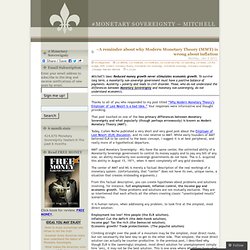
To survive long term, a monetarily non-sovereign government must have a positive balance of payments. Austerity = poverty and leads to civil disorder. Those, who do not understand the differences between Monetary Sovereignty and monetary non-sovereignty, do not understand economics. –Why the Tea Party is wrong and right — and so is Modern Monetary Theory « #Monetary Sovereignty – Mitchell. Mitchell’s laws: Reduced money growth never stimulates economic growth. To survive long term, a monetarily non-sovereign government must have a positive balance of payments. Austerity = poverty and leads to civil disorder. Those, who do not understand the differences between Monetary Sovereignty and monetary non-sovereignty, do not understand economics. . ==========================================================================================================================================
–Preventing and Curing Inflation: Modern Monetary Theory vs. Monetary Sovereignty « #Monetary Sovereignty – Mitchell. As I frequently make clear, Monetary Sovereignty is a first “kissin’” cousin to Modern Monetary Theory. They agree on virtually everything, with the exception of the prevention and cure for unemployment and the prevention and cure for inflation. I touch on both of these at: and at Warren Mosler and I have had several discussions about inflation and its prevention and cure, with him taking the position that money supply is the key, and me taking the position that money value is the key. For a more complete discussion,, You might look at the inflation post listed above and at In summary, Warren believes raising interest rates is inflationary, because it increases costs (true), and I believe the cost increase is relatively small, and raising interest rates is deflationary, because it increases the value of money.
Today, Warren sent me an Email containing a slightly esoteric, 26 page paper titled, Is There a Cost Channel of Monetary Policy Transmission? My response: MMT’s Job Guarantee (JG) — “Another crazy, rightwing, Austrian nutjob?” « #Monetary Sovereignty – Mitchell. Mitchell’s laws: Reduced money growth never stimulates economic growth. To survive long term, a monetarily non-sovereign government must have a positive balance of payments. Austerity = poverty and leads to civil disorder. Those, who do not understand the differences between Monetary Sovereignty and monetary non-sovereignty, do not understand economics.
–Again I lay my head on the MMT chopping block. Why JG (formerly ELR) is obsolete. « #Monetary Sovereignty – Mitchell. Mitchell’s laws: Reduced money growth never stimulates economic growth. To survive long term, a monetarily non-sovereign government must have a positive balance of payments. Austerity = poverty and leads to civil disorder. Questions about the job guarantee-driven economy. In the last 2 years, I have been discovering this new economic paradigm called MMT. I have come to realize that it is the best system to accurately depict the current realities of the monetary system, and is very comprehensive in explaining and anticipating the economic effects of certain financial, central banking, economic policies.
Recently, however, I'm beginning to discover that it seeks to change the current economic order, and proposes an entirely new economic system to what we have now. It looks alien to me, and I'm open about the possibility that I'm not seeing the entirety of what is actually being proposed (Because if I have it right, it looks very statist to me, and I completely veer way from MMT here). Rogue Economist Rants, If you believe some people, MMT is what caused the problems in Greece, Zimbabwe, Japan, Venezuela, Soviet Union, China, ancient Rome, and everywhere else east of the Atlantic. Should a Job Guarantee program be permanent? Keeping the JG during a boom and private sector business formation.